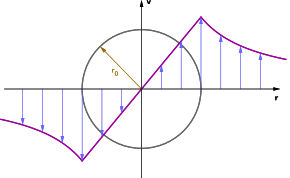Rankine vortex
The Rankine vortex is a simple mathematical model of a vortex in a viscous fluid. It is named after its discoverer, William John Macquorn Rankine.

Velocity distribution in a Rankine vortex.
A swirling flow in a viscous fluid can be characterized by a central core comprising a forced vortex, surrounded by a free vortex. In an inviscid fluid, on the other hand, a swirling flow consists entirely of a free vortex with a singularity at its center point. The tangential velocity[1] of a Rankine vortex with circulation and radius is
The remainder of the velocity components are identically zero, so that the total velocity field is .
External links
- Streamlines vs. Trajectories in a Translating Rankine Vortex: an example of a Rankine vortex imposed on a constant velocity field, with animation.
Notes
- D. J. Acheson (1990). Elementary Fluid Dynamics. Oxford University Press. ISBN 0-19-859679-0.
This article is issued from Wikipedia. The text is licensed under Creative Commons - Attribution - Sharealike. Additional terms may apply for the media files.